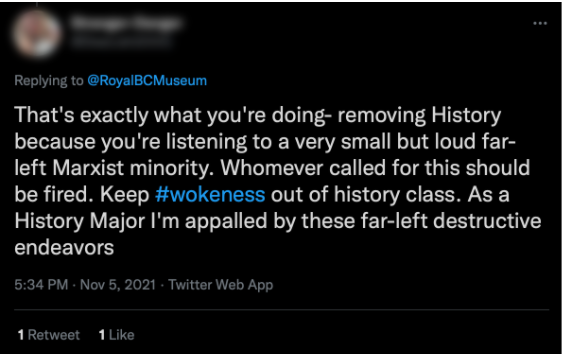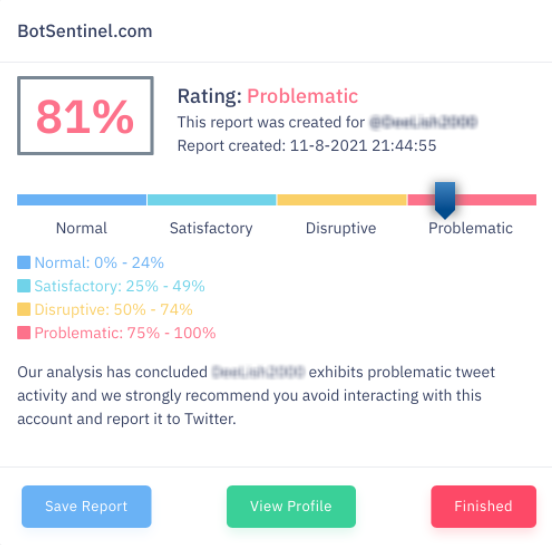Update on the BCMA’s Ongoing Commitment to Justice, Equity, Diversity, and Inclusion: January 2022
The BC Museums Association is committed to supporting justice, equity, diversity, and inclusion within the museum and cultural sector and in our own organizational practices. A key component of this commitment is being open and transparent with our community. We aim to provide quarterly updates about the steps we are taking to support justice, equity, diversity, and inclusion. If you have feedback or would like to share your thoughts, we encourage you to contact us at any time. To read our past updates, please visit this page.
Broadly speaking, museums are used to being liked. As the Alberta Museums Association’s (AMA) recent work to quantify how Canadians broadly view museums shows, the majority of Canadians have an extremely favourable view of the sector.
Since museums are generally used to positive community interactions, negative feedback can feel especially jarring. The AMA’s research suggests that only 40% of Canadians want museums to take a stand and challenge the status quo. As more and more museums are taking action to address and redress long-standing inequities, they are challenging perceptions of the roles museums play in society, a dominant public notion that museums are, or at least should be, “neutral.” In many cases, museums’ work to challenge this stereotype can result in backlash.
Responding to negative online comments is made increasingly complicated by the fact that the line between online comments from real people and bots is blurrier than ever. In the past year, the BCMA has seen a significant increase in negative online comments from accounts that display all the hallmarks of being online bots. For example, on the BCMA Facebook Page one “person” regularly leaves negative comments on any posts or events that involve reconciliation or decolonization. Looking at this person’s profile reveals that they have posted no photos, have no listed interests, and have no friends. Moreover, many of the comments follow a similar formula and often reuse the same language from post to post.
Because this account has been deemed to either be a bot or someone who is not engaging with our posts in good faith, the BCMA has an internal policy of deleting its posts and not attempting to engage with them.
The larger and more public an organization is, the greater the likelihood that it will be a target for online abuse, especially if they take a public stance that challenges the status quo. And the reason for this is quite simple – online backlash often works and groups that wish to maintain the status quo exploit this power to bully others to impede change.
Museums are trusted institutions that widely enjoy the support of their communities, therefore when faced with online criticism or backlash, it can be extremely distressing. It is important to remember that not everything you see on social media is real, especially when it comes to negative online feedback.
Recently, the Royal BC Museum announced that it would begin decolonization efforts on several long-established exhibits. This announcement received considerable national, and even international, media attention and generated a significant social media response, including online backlash.

Being on the receiving end of community backlash is distressing for organizations, but it is important to remember that in our highly politicized world, much of this backlash can be manufactured. By running the above Twitter account through Bot Sentinel, a non-partisan online tool to help distinguish between real and fake Twitter accounts, it appears that the above tweet is from a fake account, or in other words, it is from a bot and not a real human.
What is a bot?
Bots operate on social media networks and can be used to automatically generate messages, advocate for ideas, act as a follower of users, and function as fake accounts to gain followers themselves. It is estimated that as many as 9-15% of Twitter accounts (around 18.5 million) are social bots.


The BCMA is in the early stages of developing new resources to help museums navigate online misinformation and to offer strategies for identifying when online feedback is genuine or manufactured. If you are dealing with online backlash or are worried that your work to address inequalities may be met with pushback, we encourage you to hold fast. While a majority of Canadians may not currently see museums as agents of social change, we have the power to change this. For too long, we have perpetuated the idea that museums are neutral, apolitical, objective sources of truth and it will take time to change this public perception.
If you encounter an online response that your organization is struggling to deal with, we encourage you to reach out to us. We are here to support our members and want to help our sector build a better, more inclusive future. We look forward to sharing updates on our online misinformation resources soon.
Updates
The BCMA has had the privilege of working with some amazing speakers and museum professionals to explore ideas for how museums can begin to decolonize and actively support justice, equity, diversity, and inclusion. Here are some of the highlights from the past few months:
Special Webinar with Sterlin Harjo: Thank you to Sterlin Harjo, Co-Creator and Showrunner of FX’s Critical Acclaimed TV Series Reservation Dogs and to the Western Museums Association for helping us to offer this special discussion examining how museums can amplify Native/Indigenous voices. A recording of the webinar is available on our website.
If you have ideas for speakers, like Sterlin Harjo, who have valuable experience and ideas to share, but don’t come from a museum background, we encourage you to reach out to us at any time.
Remembrance Day 2021 – Diversification in Military Narratives: We were very happy to offer special Remembrance Day programming in 2021. While the idea of “lest we forget” is central to Remembrance Day, all too often military narratives only remember the sacrifices of white Canadians. Thank you to historian and author Steven Purewal and Dr. Scott Sheffield from the University of the Fraser Valley for joining us to discuss how museums can ensure their military narratives more accurately reflect the experiences of diverse groups.
A recording of this session is available on our website. Thank you to the Travelling Exhibitions Program of the Canadian Museum of History and the Canadian War Museum for sponsoring this special program.
White Supremacy 101 with Hook or Crook: On November 26 we hosted a two-hour workshop called “White Supremacy 101” with Hook or Crook Consulting. The session offered an introductory understanding of the ways that white supremacy functions across systems, institutions, and in our day-to-day lives. Participants learned about ways that we can take action to disrupt white supremacy at work and beyond.
Hook or Crook Consulting is an equity, diversity and inclusion company that weaves the transformative practices of community care and social justice into the fabric of organizations, teams and leaders. They offer one-to-one consultations, group workshops, and a variety of organization-wide supports to cultivate safer, more equitable places of work. The BCMA hopes to work with Hook or Crook Consulting again in 2022.
2021 Annual Conference: On October 7 we were joined by Brandie MacDonald from the Museum of Us for a talk entitled “Pausing to Decolonize: Decolonizing Museum Policy and Practice”. Brandie is the Senior Director of Decolonizing Initiatives at Museum of Us, residing on the homeland of Kumeyaay Nation in San Diego, California, USA.
Brandie’s work focuses on systemic change within museums through the implementation of anti-colonial and decolonial theory-in-practice, which centers truth-telling, accountability, and tangible change to redress colonial harm. Her 12 years working in non-profits is based around capacity building through transformative policy, repatriation, and education.
In her talk, Brandie discussed the work that Museum of Us has been doing to transform their organization, the decolonial work that she is leading, and the guiding principles they have adopted.
Thank you to the Cultural Resource Management program at the University of Victoria for sponsoring this conference opening address.
You can listen to a podcast version of Brandie’s opening address on our website.
In addition to the opening address, we offered a number of sessions to encourage museums to take action in support of reconciliation and redress. Conference delegates may access recordings from the 2021 virtual conference and we hope to make key sessions freely available to the BCMA community at a future date.
2020 Repatriation Grants: Communities and organizations that received funding through the 2020 Repatriation Grants have completed or are nearing completion of their research and projects. A number of the recipients have agreed to share their experiences and learnings through the BCMA so museums can better understand and appreciate how to facilitate repatriation and so that other Indigenous communities and organizations can apply these learnings in their own community contexts. We hope to feature these learnings throughout 2022 and beyond.
Actions
IBPOC Network: In January 2022, we formed the IBPOC Museum Professionals Advisory Group to guide and contribute to the creation and maintenance of the BCMA’s IBPOC Museum Professionals Network. This group is composed of BIPOC museum professionals from across BC who will provide feedback on the programming and promotion of Network resources and who are compensated for their work.
Our hope is to hold more space for Indigenous representation in this advisory group. If you or anyone in your network may be interested in participating, please email Koy Tayler.
We look forward to the initial group meeting to set in motion programming for 2022. Our goal is to ensure monthly programming, including webinars and podcasts, actively meets the needs of IBPOC/BIPOC museum professionals. As part of this Network, we plan to continue to offer monthly Tea and Talk sessions where IBPOC/BIPOC museum professionals connect and learn from one another.
Roundup: Roundup Issue 282 will be launching soon. This will be the first issue that compensates contributors for their published articles and the second to utilize an online-only publication format. While volunteer contributions have long been essential to non-profit associations like the BCMA, we recognize that everyone should be equitably compensated for their time, ideas, and efforts – and this is especially true in the arts and culture sector, where all too often people are asked to donate their time.
Our hope is that compensation will enable a greater diversity of the BCMA membership to contribute their stories for the cultural heritage community at large to learn from and celebrate. We also hope that the online format will simplify engagement with the articles through an easy-to-access website with accessible formatting, such as the ability to adjust text size and better utilize screen readers. You can find details on upcoming themes, deadlines and submission guidelines on our website.
Digital Accessibility Online Course: In January 2022, we launched a pilot of our new online course “Digital Accessibility for Museums, Galleries, and Cultural Organizations”, developed in partnership with SBLTN Consulting. The pilot is underway and we look forward to opening registration for all of our members later this year.
Governance 101 for Arts, Culture, and Heritage Organizations in British Columbia Online Course: Sector feedback from the 2021 Governance Challenges and Opportunities in B.C.’s Small to Medium Non-profit Museums report made clear that BC’s museum sector faces systemic governance challenges that contribute to burnout, toxic working conditions, and impede becoming more inclusive and diverse.
The BCMA is working to address the issues highlighted by this study. The first step we are taking is to provide better training and education for current and prospective not-for-profit board members on both their legal roles and responsibilities, but also their ethical obligations to their organization, staff/volunteers, and community. In partnership with Arts BC and the Squamish Arts Council, the BCMA is launching the three-part online course “Governance 101 for Arts, Culture, and Heritage Organizations in British Columbia” to help provide this essential training.
Honesty and transparency are a critical part of this work and we welcome our members’ feedback on how we can continue growing and improving. If you have questions, comments, or thoughts, please contact us at any time. Alternatively, if you would like to discuss how the BCMA can support your organization’s own justice, equity, diversity, and inclusion work, we would be happy to hear from you. This work will take time, but together we can use the transformative power of museums to reinvent our sector for the betterment of everyone.
